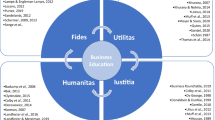Abstract
Those of us engaged in the education of future businesspersons need to ask about the efficacy of our efforts. The business person is, first and foremost, a member of the community, a citizen, attempting to meet the needs of that community by providing goods and services.
The general public often perceives the businessperson as violating the ethical standards of the community. Business risks losing its social legitimacy by such activity. Universities are the appropriate institutions in which to inculcate the importance of ethics and should go as far as it can to influence the ethical reasoning of graduates. However, research suggests that the traditional way of integrating ethics education into required functional courses actually results in a decline in moral reasoning. It is suggested that ethics educating needs to be personalized based on the individual student and that there is a need for experiential learning methods which would supplement and enhance standard classroom based ethics education. An appropriate goal for business ethics courses would be to make students aware of the ethical and social dimensions of the business decision making process.
I suggest that a service-learning pedagogy would be one way to educate the business student in ethics. An integrated service project stressing rights and responsibilities could create a feeling of what it means to be a member of a community and would emphasize the importance of social involvement.
In this paper, I explore some of the roots of service in higher education and the efficacy of service-learning in business ethics.
Similar content being viewed by others
References
Barber, B. R. and R. Battistoni: 1993, ‘A Season of Service: Introducing Service Learning into the Liberal Arts Curriculum’, P. S. Political Science and Politics, 235–262.
Boyte, Harry C.: 1991, ‘Community Service and Civic Education’, Phi Delta Kappan 72, 765–767.
Boyer, E. L.: 1994, ‘Creating the New American College’, The Chronicle of Higher Education, A48.
Boyer, E. L.: 1990, Scholarship Reconsidered (The Carnegie Foundation for the Advancement of Teaching, Princeton, N. J.).
Boyer, E. L. and F. M. Hechinger: 1981, Higher Education in the Nations' Service (The Carnegie Foundation for the Advancement of Teaching, Washington).
Boyer, E. L. and M. Kaplan: 1994, ‘A Call for a Core Curriculum’, Change, 33–36.
Boyer, E. L. and M. Kaplan: 1977, Educating for Survival (Change Magazine Press).
Bunke, H. C.: 1988, ‘Should We Teach Business Ethics’, Business Horizons 31, 2–8.
Callahan, D.: 1980, ‘Goals in the Teaching of Ethics’, in Daniel Callahan and Sissela Bok (eds.), Ethics Teaching in Higher Education (The Plenum Press, New York), pp. 61–80. Cited in Pamental, G. L.: 1989, ‘The Course in Business Ethics: Can it Work?’, Journal of Business Ethics 8, 547–551.
Cohen, J. and D. Finsey: 1994, ‘Doing Good and Scholarship: A Service Learning Study’, The Journalism Educator 48(4), 4–11.
Dewey, John: 1916, Democracy and Education (The Free Press, New York).
Dewey, John: 1938, Experience and Education, The Kappa Delta Pi Lecture Series (Macmillan Publishing Company, New York).
Dewey, John: 1933, How We Think (Heath, Boston).
Dewey, John: 1959, Moral Principles in Education (Greenwood Press, New York).
Farrington, B.: 1964, The Philosophy of Francis Bacon (The University of Chicago Press, Chicago).
Giles, D. E.: 1990, ‘Dewey's Theory of Experience, Implications for Service-Learning’, Combining Service and Learning: A Resource Book for Community and Public Service (The National Society for Experiential Education, Raleigh, N. C.).
Giles, D. E. and J. Eyler: 1994, ‘The Theoretical Roots of Service Learning in John Dewey: Toward a Theory of Service Learning’, Michigan Journal of Community Service Learning 1(1), 77–85.
Gouinlock, James: 1976, The Moral Writing of John Dewey (Hafner Press, New York).
Halfond, J.: 1990, ‘Should Business Schools Be Sunday Schools?’, Business and Society Review 72, 54–55.
Howard, M. B.: 1993, ‘Service Learning: Character Education Applied’, Educational Leadership, 42–43.
Hutchings, P. and A. Wutzdorff (ed): 1988, Knowing and Doing: Learning Through Experience (The Jossey-Bass Press, San Francisco).
Kinsley, C. W.: 1993, ‘Community Service Learning as a Pedagogy’, Equity and Excellence in Education 26(2), 53–59.
Kinsley, C. W.: 1994, ‘What is Community Service Learning?’ Journal of Adolescence 17, 341–355.
MacNichol, R.: 1993, ‘Service Learning: A Challenge to do the Right Thing’, Equity and Excellence in Education 26(2), 9–11.
McDonald, Gael M. and Gabriel D. Donleavy: 1995, ‘Objections to the Teaching of Business Ethics’, Journal of Business Ethics 14, 839–853.
McKnight, J.: 1989, ‘Why Servanthood is Bad’, The Other Side.
Sigmon, R. L.: 1990, ‘Service Learning: Three Principles’, Combining Service and Learning: A Resource Book for Community and Public Service (National Society for Experiential Education, Raleigh).
Solberg, J., K. C. Strong and C. McGuire: 1995, ‘Living (Not Learning) Ethics’, Journal of Business Ethics 14, 71–81.
Swift, J. S., Jr.: 1990, Social Consciousness and Career Awareness: Emerging Link in Higher Education. ASHE ERIC Higher Education Report No. 8 (The George Washington University, School of Education and Human Development, Washington, D. C.).
Torbert, W. R.: 1972, Learning from Experience, Toward Consciousness (Columbia University Press, New York and London).
Veysey: 1965, The Emergence of the American University (The University of Chicago Press, Chicago).
Wynd, W. R. and J. Mager: 1989, ‘The Business and Society Course: Doesn't It Change Student's Attitudes?’, Journal of Business Ethics 8, 487–491.
Author information
Authors and Affiliations
Rights and permissions
About this article
Cite this article
Fleckenstein, M.P. Service Learning in Business Ethics. Journal of Business Ethics 16, 1347–1351 (1997). https://doi.org/10.1023/A:1005762503770
Issue Date:
DOI: https://doi.org/10.1023/A:1005762503770




